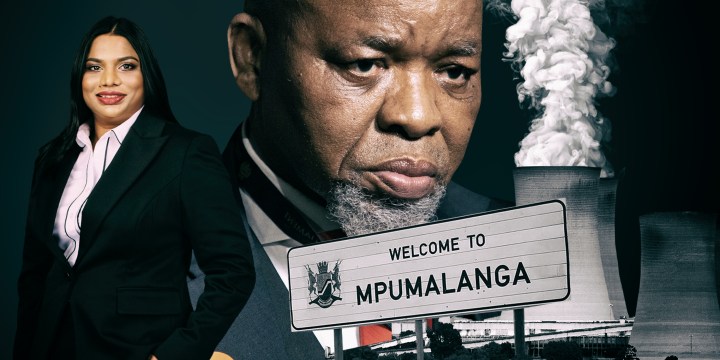JUST TRANSITION
Mpumalanga a potential renewable energy hub, not Mantashe’s envisaged ghost towns – Eskom’s Mandy Rambharos

In contrast to Energy and Mineral Resources Minister Gwede Mantashe’s keynote address delivered earlier in the day, Eskom executive Mandy Rambharos said that despite Mpumalanga’s legacy dependency on coal, it was not yielding tangible benefits in employment and health outcomes.
Minister of Mineral Resources and Energy Gwede Mantashe on Wednesday reiterated his belief in coal’s central importance to the livelihoods of many people in Mpumalanga.
However, Mandy Rambharos, the general manager in the office of the group chief executive of Eskom, said separately that while jobs along the coal value chain would be threatened, the province was not benefiting to the degree coal proponents suggest and that there were benefits in accelerating the province’s move to renewable energy.
Delivering the keynote address at the opening of the Windaba Conference and Exhibition 2022 in Cape Town on Wednesday, Mantashe reiterated a point he had made a week earlier at the same venue during the Africa Oil Week and Green Energy Africa Summit.
“Our energy transition approach towards a low carbon emitting system or net-zero should not be driven by technology preferences but by energy system requirements and innovative use of indigenous resources which include the sun, wind, nuclear, water, coal, oil and gas.”
He said Mpumalanga had benefited from the coal mining industry and the various uses of the commodity along the value chain. He said if the use of coal was stopped, this would almost instantly create 10 ghost towns.
Speaking at the Africa Oil Week and Green Energy Africa Summit last week, he said the same thing, explaining that the “Coal Belt” was composed of “10 towns of contiguous coal mining” and that “there will be 10 ghost towns” overnight should all coal-related activity cease.
He listed the 10 towns: Belfast, Carolina, Delmas, Ermelo, Hendrina, Kriel, Leandra, Middleburg, Ogies and Witbank.
“If you just switch off that area, [they] will be dead immediately,” said Mantashe.
Read more in Daily Maverick: “How do you instantly create 10 ghost towns? Stop using coal, Gwede Mantashe warns”
The minister on Wednesday again chose to omit a number of relevant facts and statistics that make his foreboding projection of a string of contiguous ghost towns seem less ominous and the supposed benefits of the coal industry’s substantial presence in the province less deserving of uncritical solemnity.
The missing context
Rambharos, in a later seminar on “unlocking access to the grid”, added the missing context to Mantashe’s warning. She explained that coal was not solely a benefit for the province and that great opportunity and potential lay in the province’s nascent energy transition.
She pointed to the health and environmental impacts of coal mining and burning coal to generate electricity beyond their contribution to global warming and anthropogenic climate change.
More than 29,000 premature deaths are caused in South Africa every year by ambient and household air pollution, Rambharos noted. She added that opencast mining, exacerbated by illegal and poorly regulated mining, caused extensive environmental degradation. Giant coal ash dumps, she explained, contaminated the air and groundwater in addition to the more than 270 billion litres of water Eskom uses annually.
Daily Maverick previously reported that a leaked Council for Scientific and Industrial Research (CSIR) study found that more than 5,000 people die annually in Mpumalanga because the government has failed to fully enforce its own air quality standards. The report revealed that nearly a quarter of households in the region, where 3.6 million people live, have children with persistent asthma — double the national rate.
Visit Daily Maverick’s home page for more news, analysis and investigations
Despite Mantashe’s warning of how a disruption in coal mining would spell disaster for the Coal Belt towns, the unemployment rate in the province is already higher than the national rate, especially for vulnerable groups, despite citizens of the province supposedly benefiting from coal.
South Africa’s average unemployment was 34%, Rambharos noted, while in Mpumalanga it was 36%. For women in Mpumalanga, the unemployment rate was 39% and for young people, it was 48% — 3% and 2% higher than their national counterparts, respectively.
Rambharos explained that Mpumalanga also had the markings and requirements for a renewable energy hub.
Referencing a CSIR study, she noted that the province had some of the best wind resources, with an average wind speed of roughly 6-7 m/s2 (metres per second squared). While the Northern Cape and Eastern Cape — the provinces with the best renewable energy resources — battle grid capacity constraints, Mpumalanga, with its legacy as the home of South African electricity generation, has ample transmission capacity, with some 6.5GW of capacity available immediately. Moreover, there are roughly 200,000 people in the workforce that can be reskilled or trained to work in the renewable sector, she explained.
The research institution Trade and Industrial Policy Strategies has, in its coal value chain report, noted that “the value chain as a whole employed around 200,000 formal workers and was the main source of livelihoods in eMalahleni [Witbank], Steve Tshwete [Middelburg], Govan Mbeki [Secunda] and Msukaligwa [Ermelo]”.
Accordingly, a transition in Mpumalanga would, on the face of it, seem poised and able to offset the job losses that would accompany a transition from coal.
“The status quo has severe challenges… the status quo is not working… there absolutely needs to be change,” Rambharos said.
Benefits of moving from coal
Speaking on the benefits of a move from coal and other fossil fuels, Alison Doig, the director of the Health and Climate Network, said: “Around the world, governments must implement the energy transition needed to address climate change to not simply replace the current, centralised fossil-based energy systems with a low-carbon facsimile, with profits captured by the old public and private fossil fuel companies, but instead deliver a system of diverse technology, innovative solutions and decentralised ownership, with a focus on people, health and the environment.
“To be a truly just transition, it must engage workers, impacted people, consumers, those without energy access and health professionals; and ensure the transformation is restorative, by remediating the damage done to nature and health during the fossil fuel era.
“The potential health benefits of the transition to a fossil fuel-free society are extensive, averting millions of premature deaths due to air pollution each year, primarily from noncommunicable diseases, and ending the known occupational health risks faced by coal miners and oil and gas workers.
“It can also generate dramatic physical and mental health gains among those using active transport, accessing healthier diets and living and working in healthier cities.” DM/OBP





















 Become an Insider
Become an Insider
I don’t get what leverage Mantashe has over CR. It is tough choosing the worst among Mantashe, Mbalula, Cele, Dlamini Zuma, Sisulu or a dozen more ministers in that cabinet. Imagine being a fly on the wall in a meeting of CR and his 30 ministers! Roll call and welcome must take 30 minutes. Then 30 minutes for apologies for not being there. Then two hours dealing with the minutes of last meeting. Then heaven knows dealing with progress on matters for attention from last meeting. Then, I give up. Monty Python would have a field day with just the titles of our ministries.
Read news 24 today. CR fighting for his life.
If you are referring to the article about Independent Media, I do not know what sane person still read anything coming from the bullshit factory called IOL (as a well known and credible reporter so eloquently put it)
Iqbal Surve is also fighting for his life with almost all of his bank accounts already frozen and the rest to probably follow suit. This cannot happen soon enough.
I dont understand Mantashe and his oposition to renewables and IPP’s. Eskom will always be a massive part of it. Eskom have the network to deliver power generated by IPP’s and there is nothing stopping Eskom producing its own green power creating jobs (other than incompetance), maybe setting up schools of excellence in generating electricity? So much potential and oportunity for the country in this field. There is no doubt it is the future. We need to stop dithering.
I don’t understand anything associated with the ANC Government.
Their biggest problem with renewables is that it can be done in smaller scale projects run by private companies. With these, it will be much more difficult to set up cadre feeding and self enrichment schemes. It really is as simple as that.
The incompetence and lack of leadership of Minister Mantashe is astounding.
He is the handbrake, he does not add value to his portfolio, Mantashe must go.
His statement about ghost towns being an outcome of the move away from using coal makes no sense in terms of justifying the continued use of coal to justify the sustainability of the these towns. A bit like saying that we need to continue using steam locomotives and not electric locomotives so that the small towns along the track survive.
Again the tactic of scaremongering is used rather than the use of scenario planning.
The minister should be providing leadership in steering towards alternative fuels, away from coal over a period of time in terms of a short, medium and long-term plan.
Unfortunately, our ANC-led government is not competent in the forward-planning department.
It may be a good idea that Mr. Mantashe consults with CR so that they are at least on the same page.
In closing, the use of coal to generate electricity has negative effects other than poor air quality such as the destruction of the roads (potholes and the disappearance of the entire road surface in some instances) by the trucks ferrying the coal which results in unnecessary wear and tear issues for other road users and the risk of accidents caused by the poor road surface. At what cost?
20 years behind, working hard on 40 years behind.
Gwede Homo Naledi is living in the dark ages. Then again so is the ANC and EFF.